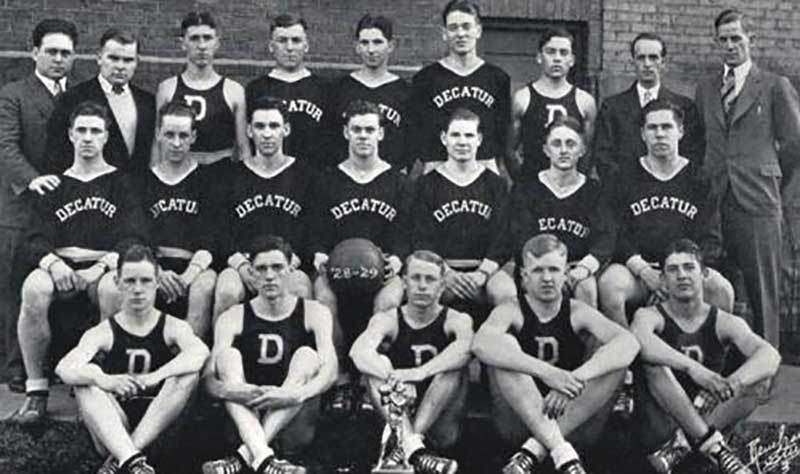
By Tony Holler
You are the same today as you’ll be in five years except for two things: the books you read and the people you meet. — Charlie “Tremendous” Jones
Next month I will deliver a four-minute speech when I get inducted into the ITCCCA Hall of Fame. I will have to condense 34 years of coaching into 4 minutes.
“And you may ask yourself, well … how did I get here?” … The Talking Heads from the song, “Once in a Lifetime” (1980).
The most powerful influences in my life were coaches. From the day I was born, a coach shaped my world. Coaches continue to impact my modus operandi at age 55. I won’t be able to fit these 4500 words into a four-minute acceptance speech. The twelve coaches introduced in this article answer the question, “How did I get here?”. Every coach on my list is a member of some Hall of Fame, and if not, they will be inducted soon. Many of the coaches on my list belong to multiple Hall of Fames.
Most coaches work in relative anonymity. We aren’t known outside of our circles of influence. Do you remember your coaches? Sometimes I forget my dog’s name but I will always remember my 7th-grade basketball coach.
If you haven’t heard of some of these guys, keep reading. We can learn from people we have never met.
You Don’t Form Habits By Talking About Them
I might as well lead with my ace. Bob Knight does not know me, but I know him. At one time, I was the youngest head high school basketball coach in Illinois (Harrisburg, 1982). Everything was stacked against us. Harrisburg achieved only one winning season in the previous 20 seasons, and the team had gone 0-25 the year before I got the job. I wanted to win so bad it kept me up at night. Bob Knight coached 180 miles from Harrisburg. I attended some of his practices. I paid a small fortune to attend “The Bob Knight Coaches Academy” (20-some hours of instruction). Indiana was not my favorite team, but Bob Knight was my basketball guru.
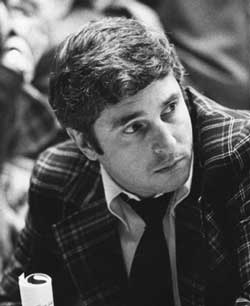
Everything you do in practice must be evaluated. Does it win games? I still quote Knight, “You don’t form habits by talking about them.” Indiana’s practices were amazing. Nothing lasted more than ten minutes. Quality over quantity. Everything was intense and full of focus. I never heard Bob Knight raise his voice or show the personality flaws which later defined him. All I saw was a teacher at his best. He was especially good at teaching coaches. I hung on every word. I filled a notebook. Once I spoke with him after a practice. He was gracious and attentive.
Many football coaches today run practice in 10-minute segments. Anything lasting more than 10 minutes becomes redundant and counter-productive. Bob Knight revolutionized coaching, and I was one of his students.
Middle School Coaches Are Just as Important as College Coaches
Ok, you know Coach Knight but you probably don’t know Coach Kaiser. That’s the beauty of coaching. You don’t have to have to be famous to be a great coach. Bill Kaiser of Princeton, Illinois, was just as important to me as Bob Knight of Bloomington, Indiana. Bill Kaiser was my basketball coach when I was a 5’8″ 120-pound 7th grader. He also coached me when I was a 6’0″ 140-pound 8th grader. Bill Kaiser was also my 7th grade English teacher. We read Huck Finn. He shocked the class when he told us to read everything, even Playboy.
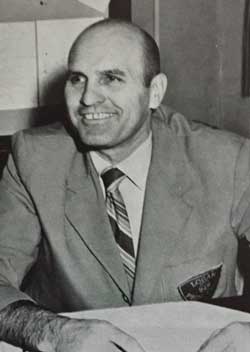
Bill Kaiser was a man’s man with bronze skin and a shaved head. He was a former football star who had played for the New Mexico Lobos in the early 50’s. He spent his entire adult life working with kids. His record as a basketball coach was 346-120. He lived a stone’s throw from the little league ballpark. If my memory serves me right, he was the little league commissioner. In the winter, he spent his Saturday mornings supervising “Biddy Basketball”, a 10-team league of 5th & 6th graders.
Coach Kaiser was kind but tough. It was over 40 years ago, but I can still hear him saying, “I will knock you down twice, and pick you up once.” He was only half-kidding. I was so lucky to have such a strong adult role model in my life. I look around today and don’t see many career coaches at our middle schools. They are all getting their administrative degrees.
Coach Kaiser was way ahead of his time. Our practices always began with stations. Our strength training involved homemade weights, bars fused with concrete formed inside of coffee cans. Can you picture it? We wore ties on the day of a game. He dressed up, too. Anyone who shot over 60% from the free throw line for the year got a Dairy Queen milkshake. Anyone who could touch the rim won a milk shake. We also won milk shakes for leading the team in assists, rebounds, steals, etc. Never underestimate the motivation that comes from winning a prize. I won seven milk shakes in 1973.
Everyone Should Run Track
The first guy who gave me a job was Gene Haile, the Athletic Director at Harrisburg in 1981. Gene Haile was somewhat famous in Southern Illinois. He had been the basketball coach at tiny McLeansboro when they went 132-33 from 1959-1964. McLeansboro’s star player was Jerry Sloan of NBA fame. Jerry Sloan said at his Hall of Fame induction, “My freshman year of high school I played for Coach Gene Haile. He was the head football coach and freshman basketball coach. He went on to become the head coach for basketball, football, and track. Under Coach Haile in order to play either one of those sports, basketball or football, you had to run track, and there is nothing I hated any worse than having to run two miles. But, I soon realized that what he was trying to do for me by making me run the hurdles and run long distance.”
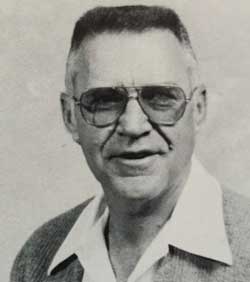
I also knew Gene Haile through my mom’s brother (my uncle) Kevin Kane. Kevin was an All-State football player for Coach Haile at Carmi High School in 1970. Carmi went undefeated with Gene Haile as coach and Kevin Kane as his quarterback.
When I joined forces with Gene Haile in 1981, he was at retirement age. He ran two miles every day and wrote his weight on a calendar. He was an ex-military guy and still wore his hair like a Marine. Haile had been hired to make Harrisburg competitive in the South 7 Conference. He cleaned house and hired several coaches from outside of Harrisburg. Schools in Southern Illinois typically suffer from inbreeding. Gene brought in new blood.
Harrisburg became one of the few schools in Illinois to put all of their athletes into 7th-hour P.E. The class was called “Athletics” and it wasn’t taught, it was coached. Athletes were either in a sport, or they were running and strength-training every day. No dodgeball for athletes. In addition, all athletes were forced to run track. Baseball players had to go to track practice before going to baseball. This rule only lasted few years. It’s hard force anyone to do anything.
Gene Haile was the ultimate multi-sport warrior and Harrisburg was forever changed. Many people disagreed with Gene Haile, but he didn’t care. Gene Haile made Harrisburg, per capita, the best high school athletic program in the state of Illinois.
You Don’t Have to Be Trendy
The football coach at Harrisburg in 1981 was a guy named Al Way. Al Way was in his 30’s, but he seemed old to me. Soon we became good friends. Al Way loved every sport. If we could quantify someone’s thoughts, Al Way probably devoted 75% of his consciousness to high school sports. He coached football but also assisted in wrestling. Al spent a couple of years as my throws coach in track. In addition, he assisted in baseball. When his daughter, Chrissy, was one of the best softball pitchers in Illinois, who was the head softball coach? You guessed it. Al Way’s favorite sport was basketball. I’ve played lots of basketball in Harrisburg, all of it with Al Way. Al Way’s multi-sport theme is so strong that his son, Scott, played basketball AND wrestled during the winter of his freshman year. I’ve never heard of such a thing.
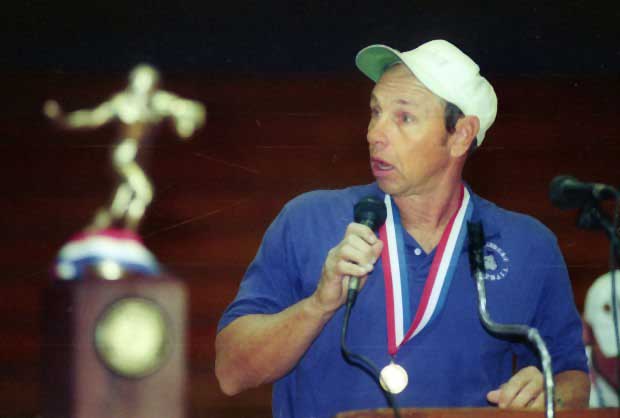
Coach Way after winning the 2000 Class 3A football championship. Harrisburg dominated the IHSA playoffs winning 53-8, 48-10, 53-21, 49-17, and 41-13.
Al Way hated summer football. He was haunted by stories of other teams practicing every day in full pads during the off-season. To Al, summer was baseball season, with some 3 on 3 basketball mixed in.
There was too much standing around at Al Way’s football practices but maybe that’s what happens when a varsity football team has only two coaches. His teams went 186-68 and won the 3A State Championship in 2000. He doesn’t know it, but I’ve won 30 consecutive freshmen football games running a version of his 1950’s offense, the Boz Adams’ T-formation. Way retired in 2002, came back for one season in 2006, and was recently named head football coach, again, at Harrisburg High School. Harrisburg fans have watched misdirection out of the T-formation for five decades.
Winning Does Not Define a Coach
I graduated from Knox College in Galesburg, Illinois. Knox was a free-thinking liberal arts school with an average ACT of 27. Almost all of Knox’s 1200 students lived on campus. I went to Knox for one reason, Harley Knosher.
Harley Knosher looked you in the eye when he spoke to you. He remembered everyone’s name. Parents would drop off their kids for a basketball camp and Harley would remember the parent’s names six days later. I’ve never known a better public speaker. He looked like a generic white guy, but his charisma was almost scary. Harley Knosher was a central figure at Knox College from 1960 to 2000. Knox is running out of things to be renamed Knosher. When he dies, Knox College may become Knosher College. I am not exaggerating his impact.
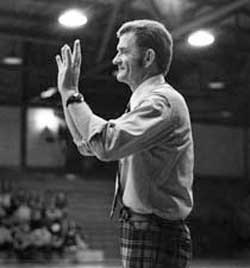
Here’s an odd twist to my story. As a freshman, I played on the Knox JV team in 1977-78, so technically, Harley was not my coach. My sophomore year, I was one of the best ten players, but Coach Knosher shocked me when he read off the 15-man varsity squad. I was exiled back to the JV team. I was devastated. In later conversations, Harley intimated that he agreed that I may have been one of the top-10 players at Knox. However, Harley wanted his bench to be “team guys” … players who cared more about the “team” than their own playing time. Some players from the Knox 15-man roster were bench-warmers in high school. They understood their role and were satisfied with little or no playing time. The guys on the bench at Knox wore a big smile and a fresh haircut. Looking back, I just didn’t fit in.
I never played organized basketball again, and I’ve never gotten over the disappointment. However, Harley Knosher remains one of the most influential men in my life. I disagreed with some of Harley’s ideas but his honesty and sincerity won me back. I’ve never known a smarter coach. I took two of his half-credit courses, “Coaching Basketball” and “Athletic Administration”. Harley Knosher was the best teacher I had at Knox College.
It’s strange that Coach Knosher became a legend at Knox despite his 254-270 record as a coach. We all need to learn that wins and losses do not define us. I wrote Harley Knosher recently, and he responded with a multi-page letter.
Quality Over Quantity
I’ve been in the same room with Paul Souza for less than an hour. Coaches have the power of changing lives in an instant. I saw Paul Souza in St. Louis back in 1998. He introduced me to the word “epiphany” and that’s exactly what I got from his presentation. Souza performed the best clinic presentation I’ve ever witnessed … and I’ve been going to clinics since I was ten years old. Souza owned the room.
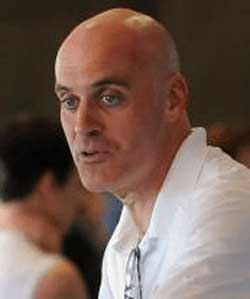
Paul Souza was not famous. When I saw him speak, I had never heard of him. He served as the head track coach at Division-3 Wheaton College in Norton, MA. His teams won 8 National Championships, and he coached 284 All-Americans. Souza was highly involved in USATF and founded the Elite Track and Field Series. Souza high jumped 7’4 1/2″ indoors in high school.
Paul Souza explained how you could run sub-48 in the 400 without ever running further than 200 meters in practice. Epiphany. My coaching life was forever changed. In addition, I was inspired to become a Souza-like clinician someday. I have now spoken at 20 track & field clinics.
I maintained Paul Souza as a resource. If I emailed him 100 words, he would respond with 1000 words. Here is an excerpt from an email from April 22, 1998. I had emailed Souza looking for advice on how to get my 4×4 under 3:20.
“It is time to do Critical Zone work. I suggest, early in the training week, that you do workouts like fast 150’s or 200’s with 15 seconds recovery. This will flood the system with lactic acid and teach runners how to deal with it. If you do four, you’ll be lucky. If you want to, do a couple, give them 10 minutes recovery and do another set. They will hate you for it, but it will produce results. Only do these workouts once a week and make it early in the week. Then do fly 30’s or 40’s for turnover two days a week. And give them plenty of rest. You might even warm them up and send them home for two days.”
The paragraph above has become my core training philosophy for the past 16 years.
By the way, we broke the 3:20 barrier two weeks after this email.
Paul Souza is the only coach on my list who left coaching for a second career. He is now the lead singer of the Velveteen Playboys.
Teacher, Coach, Father, Husband
Kelly Kane was a head football coach for 40 years. His teams won 196 games. Kelly is my mom’s little brother, my uncle, and my best man when I got married in 1983.
When I was a freshman quarterback on Princeton’s sophomore football team, Kelly Kane was the young head coach at Spring Valley Hall. I was 14, he was 24. When our teams played each other, my team won the sophomore game, his team won the varsity game. Kelly’s team did not lose that year.
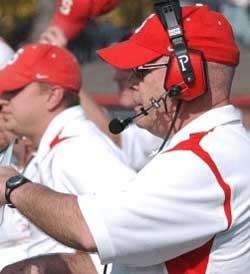
When I was a student at Knox College, Kelly Kane was the football coach in the same town, Galesburg. Since we had different last names, no one at Knox knew Kelly was my uncle. With an incredible stroke of luck, Kelly was my supervising teacher when I did my student teaching in 1981. My apprenticeship took on additional meaning when I moved in with my aunt and uncle, and their three very young children. I slept in their basement for ten weeks, saving money and removing myself from the Knox College “Animal House” also known as Beta Theta Pi. Those ten weeks taught me more than any ten weeks in my life.
I learned to teach science. Kelly was a top-notch teacher. I learned how educators balanced teaching with coaching. Kelly Kane was a heroic figure to me. He was a list-making, dedicated, disciplined, intelligent, physically fit, father of three. I was 21 years old, Kelly was 31. The most important thing Kelly Kane taught me was how to be a good husband and a good father after a long day at school. After the ten weeks of sleeping in the Kane basement, the vision of my future was complete.
Train Smarter, Not Harder
I saw Chris Korfist speak at a clinic in or around 2008. It was immediately apparent to me I was in the presence of greatness. First of all, his training techniques were very similar to mine. Wink. No, seriously, Chris opened a door to an entire world of training sprinters that I never knew existed.
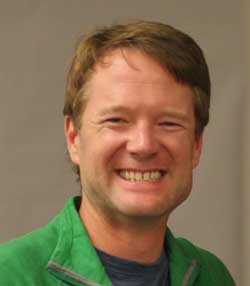
Chris Korfist was the highly successful sprint coach at Elmhusrt York H.S. York won the state championship last year. Chris does most of his work in his basement, his driveway, and the street in front of his house. From month to month his training ideas evolve so fast it’s hard to keep up. I usually just stand and watch. When I’m with Chris, I understand the importance hanging out with people smarter than me. I learn things from my athletes, but I’m blown away when I visit the mad scientist from Burr Ridge.
I’ve learned about gait analysis because Chris has a close relationship with Dr. Shawn Allen. I’ve learned about superfoods. I see weight training equipment in the Korfist basement that I’ve never seen anywhere else. I once inquired about the cost of one of his machines and Chris answered, “Napoleon said, ‘If you have asked about the cost, you’ve already lost the war.'”
Chris Korfist has connected me with Douglas Heel of South Africa. In the coming years, you will hear more and more about “manual therapy” and “performance therapy”. ART and MAT are both gaining a foothold in sports performance. The most exciting thing I’ve found in recent years is “Be-Activated” by Douglas Heel. Two of my sons are coaches and will attend the Be-Activated seminar in February. I’m also sending my jumps coach, Dr. Brian Damhoff.
Chris Korfist and I are in the planning stages to co-host a two-day “speed academy” for coaches this summer.
Connect With Athletes
I met Jay Thompson the first day I moved to Harrisburg. He picked me up at my trailer (yes, I lived in a trailer but not in a trailer park), and we went to a party where I talked to a girl who I married two years later. Like all coaches hired by Gene Haile, Jay Thompson was a three-sport coach. His passion was baseball.
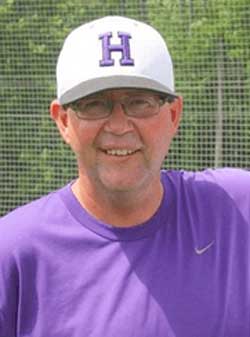
34 years later, Jay Thompson is one of the winningest baseball coaches in Illinois history. His teams have a record of 670-187. From 2003-2009, Jay stepped down and assisted his brother, Joe, as Harrisburg went 159-44 and won the 2004 state championship. In 1989, Harrisburg’s baseball team was nationally-ranked in USA Today and beat Schaumburg for the Class AA (big-school) state championship.
Jay was a coach. Jay had incredible relationships with kids. I was jealous of how his players loved him. Jay spoke with a quiet voice that made players work to hear his words. In addition, he only spoke when necessary. I knew ten-times more basketball than Jay, but he was the greatest freshmen basketball coach I’ve ever seen. You see, it’s not what you know, it’s what you emphasize. The education world is full of experts that can’t make connections with kids. I learned how to connect with kids by watching Jay Thompson.
Jay and I coached freshmen football together in the 80’s. In the 90’s, we worked together as head baseball coach and head track coach to produce two of the best programs in the state of Illinois. My 7’2″ high jumper played center field for him. Jay’s star 2nd baseman was an all-state discus thrower for me. We put kids first for the benefit of baseball and track, and most important, for the benefit of kids.
Winners Compete
When I moved to Oswego in 1974, I did not play football because we didn’t move to town until late August. Plus, I hated football practice and only liked playing in games. My P.E. teacher, Roger Wilcox, was a gruff-sounding man who was also the head football and track coach. Every time he saw me he would growl, “Holler, if you are the best quarterback in the school, you need to be playing football.” As our relationship grew, he convinced me to run track in the spring.
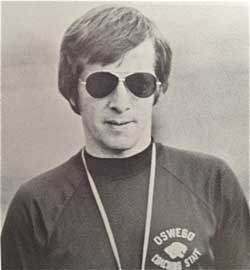
I was 6’2″ and weighed less than 160 pounds, but I had a long stride and was willing to race. In the conference track meet, Roger Wilcox ran me anchor in the 4×4 despite the fact that I was only a sophomore. When I took the baton, I passed both teams who were in front of us. I may have bumped the guy from Kaneland. Well, we won the race, and I ran a personal-record split, but we were disqualified. I will never forget walking onto the bus afterward. No one spoke to me. When Coach Wilcox got on the bus he barked, “If all of you competed like Holler, we would have won this meet.” That’s all he said. I was his quarterback the following year.
Roger would always joke that I got him fired as a football coach. My career ended in game four of my junior year, when I sustained a severe shoulder injury. Our team was 2-2 at the time. We finished 2-7, and Roger Wilcox got fired.
Roger Wilcox was a competitor, not a quitter. Most fired football coaches never coach again. Roger returned to coach lower-level football at Oswego. He continued to serve as head track coach until 2004. Two of his eleven conference titles happened in my junior and senior seasons. This was especially significant due to the excellence of our conference. Sycamore had a 7’5″ high jumper named Gail Olson. Mark Claypool of Kaneland ran the 400 in 46.9.
Roger Wilcox always treated me like I was his favorite athlete, ever. Whether I was or not, I will never forget the feeling.
Your Purpose In Life is to Find a Purpose
My dad was a coach when I was born in 1959. He continued as a head basketball coach until 2004. His career record was 644-439. Don Holler coached at five high schools and one college, Aurora University (1978-1996). For 44 of his 47 years, he was a head coach.
My childhood consisted of gymnasiums, locker rooms, school buses, games, and concession stands. In many ways, 90% of my life has been spent in high school.
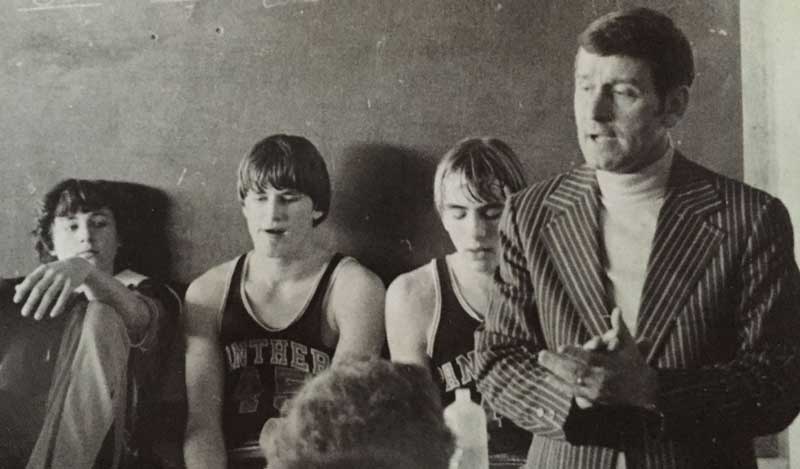
Don Holler addressing his team at the East Aurora Tournament 1975.
Don Holler was and is an incredibly gifted public speaker. His deliveries always seemed perfect whether it was pre-game, half-time or post-game. I’ve heard thousands of them. At banquets, he was a pro. My dad probably should have been a preacher. My father’s congregation was his team. You see, Don Holler grew up as a poor kid in government housing back in the 1940’s. He grew up relatively unsupervised, and sports became his salvation. His high school basketball coach, the legendary Gay Kintner of Stephen Decatur High School, became his surrogate father. Gay Kintner won 649 games, my father won 644.
My dad always related best to players who had come from the wrong side of the tracks. Don Holler loved all his players, but he especially loved the kids that needed him most. Since retiring in 2004, my dad has worked as a Dean’s Assistant at Waubonsie Valley High School.
My father’s college dream was to have a family and to be a coach like Gay Kintner. I am a continuation of that dream.
+++
And that was where my article was going to end.
I woke up in the middle of the night last week, and my thoughts about Gay Kintner raced. Am I the continuation of the work done by a man who died three days before my first birthday? It kept me awake.
My father told me this numerous times, “I want to die on the bench, just like Coach Kintner.” That wish almost came true. Three year’s after my dad’s retirement from coaching, doctors found a 98% blockage in his proximal left anterior descending coronary artery, “the widowmaker”. A quintuple bypass surgery saved Don Holler from the same fate as his high school coach.
Old Coaches Never Die
Yesterday, I went to my parents’ house and asked my dad if he had any pictures of Coach Kintner. It’s a powerful thing for a 55-year-old man to watch his 79-year-old father cover his bed with pictures and news clippings of his 119-year-old former coach. Those keepsakes were not found hidden in the basement or the attic. Those sacred artifacts are kept in my dad’s bedroom, always near.
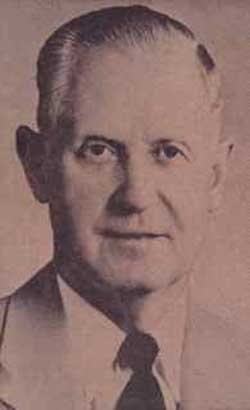
It’s amazing how much you learn when you ask questions. I did not know my dad was coached in the 7th, 8th, 9th, and 10th grades by Gay Kintner’s son, Galen Kintner. From 1949-1954, it was always “Coach Kintner”.
Everyone remembers the incredible movie “Hoosiers” which was loosely (very loosely) based on a team from a small school in Indiana winning the state championship against all odds. The movie was almost entirely fictional. However, it’s an absolute fact that Milan High School, with 161 students, won the Indiana State Tournament in 1954. Milan’s coach, Marvin Wood, was 26 years old and never coached his team wearing a tie like Gene Hackman did in the movie. He often suited up and practiced with the team.
Don Holler was a senior at Decatur in 1954. His coach was 59 years old and wore a suit and tie at every practice and every game. Gay Kintner never wore a whistle. Kintner hired two registered officials to officiate every practice.
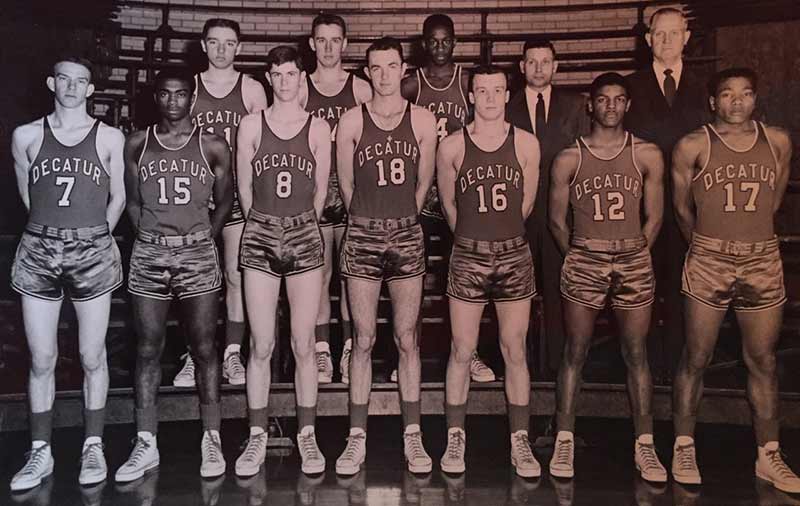
I’ve seen pictures of the 1954 Milan team, and they would have had trouble with this team. My dad, Don Holler, is the middle player in the back row. This team was integrated 17 years before Gay Kintner’s famous friend, Adolf Rupp, finally integrated his team, the University of Kentucky (1970-71).
The Decatur “Running Reds” traveled everywhere, even to Indiana. Kintner did not believe in holiday tournaments and his teams did not practice over the holidays. Practices were typically two hours but players would sometimes stay until 9:00 PM playing on their own, unsupervised. Can you imagine unsupervised play in today’s lawyer-driven schools?
The team traveled first-class in charter buses. Once, upon learning a player had stolen silverware from a restaurant in Mattoon, Kintner made the entire team return to Mattoon in order to return the silverware and apologize to the restaurant manager. The “Running Reds” made the 90-mile round-trip twice that day.
Coach Kintner was aware of my father’s lack of supervision and would often bring him along on scouting trips. He also provided food and encouragement. One black player worked nights at the foundry across town. Coach Kintner routinely drove him to work. Kintner once gave my dad a basketball and told him, “Wear it out. You are going to be one of my great ones.” Words like that are never forgotten.
Gay Kintner died three days before my first birthday. My dad had just turned 23. I recently found an article reporting Coach Kintner’s death back in 1960. Gay Kintner changed many lives. I have no doubt that Don Holler coached for 47 years because of the example set by his high school coach. Gay Kintner influenced me through Don Holler. Maybe there’s some quantum entanglement going on here.
When I think of the hundreds of kids I have coached, I wonder what they remember. Two of my sons have chosen to be coaches. I wonder if Alec and Quinn have been influenced, unknowingly, by coaches they have never met. Three of my former athletes are terrific coaches at Triad, Edwardsville, and Belleville West. What impact will they have? Will their coaching echo in future generations?
Please share this article so others may benefit.
[mashshare]
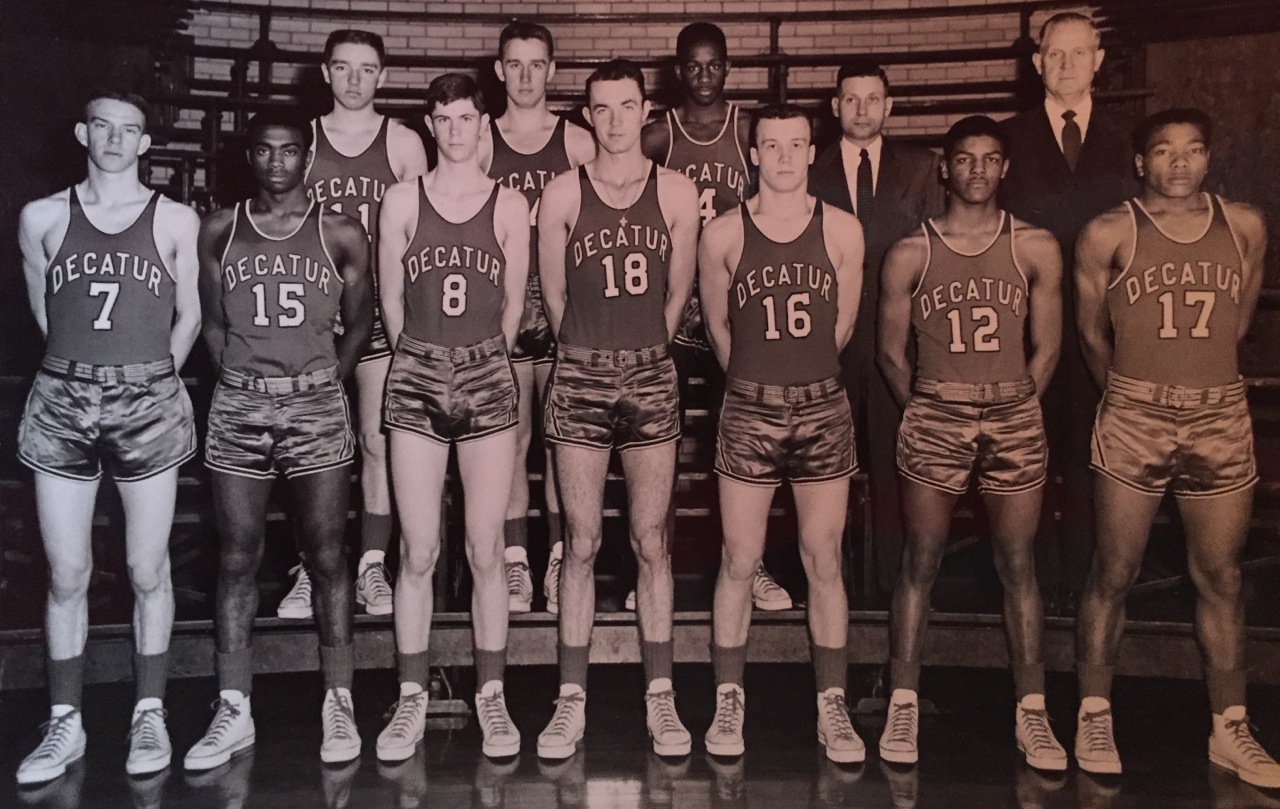

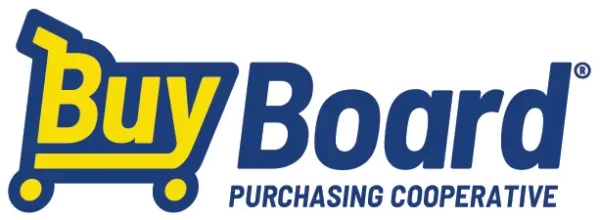
I just finished reading this and am now writing this off the cuff, as Coach Tony Holler deserves to have a comment about his influence. This won’t be as eloquent and detailed as his writing above, but it should let him know he had an impact. I loved Coach Holler as my coach at HHS. I was a tall skinny (6’5″ 150lb senior with a really bad knee) kid who loved basketbalI. I admired Coach Holler from day 1. He was cool, he wore Adidas, he liked music and I could tell he loved coaching and he liked his teams. He turned our team around. Yeah, it was embarrassing following a team that went 0-25. But our team changed that. One of our highlights was getting 2nd place in the Eldorado Holiday Tournament, losing to McLeansboro who had Jerry Sloans son, Brian, as their star, and Illinois’ Mr Basketball. But Coach Holler taught me many things he doesn’t even know. I learned a lot about basketball, respect, and being a leader. I honestly still think about Holler and those days. I didn’t have the greatest, most inspirational dad, I wanted to be friends with Coach Holler. I’m an armchair coach, with a desire to be a basketball coach, and I know I’d mimic Holler if I was to coach. He was a good guy and a good coach and I respected the hell out of him even though he introduced us to “Hell Week” which was 6am practice and after school practice….we’d never had that before. But he helped us, he knew talent, he helped players move on to the college level. To finish up my rambling now, I just want to also let Coach Holler know, he’s got his influences and coaches he’s admired….he is one to look up to and respect and admire too.
Gabe,
It’s been too long!
Thanks for commenting on my article. I am especially honored that someone remembers me from so long ago. I coached you when I was beginning my career, age 22 to 25. When I reflect back, I am sometimes embarrassed by how little I knew back then.
It’s strange how little I remember from my early twenties. However, much of what I do remember involves the teams I coached. I still remember your jump shot, your long thin frame, and your bad knee.
Your words inspire me to continue to coach. I wonder how I would live without it.
Good luck to you.
Coach
Twitter: @pntrack & @anthonyholler
Email: [email protected]
Phone: 630-849-8294
Great blog Tony. There quite a few coaches that I can remember that helped shape me as well. Now here I am doing the same thing shaping and molding lives. Wrote my first blog for ITCCCA called “Coaching for the Long Haul.” Check it out and leave a reply.
Tony,
My name is Mike Flaig and I was a third sometimes second stringer for Coach Kaiser at Logan Jr. High School in the 79, 80 season’s. I came across your article because I have been thinking about Coach for the past few years starting when I coached my daughter’s middle school teams trying as hard as I could to emulate Coach Kaiser’s practices. It was great for you to include him and be able to read about your recollection of the practices. When first coaching I tried to locate Coach Kaiser and when unsuccessful researched extensively trying to find the one and two man stations we did everyday, even looking up John Wooden material as I believe Coach was a big believer.
I was on a great Jr. High team as we went 40-0 over the two seasons so everyday got to practice against some very good players. That experience and some growth lead me to be a starter my senior year and I went on to play small college division three ball. I bring it up only to mention that Coach Kaiser traveled to several of my college games and to let you and the world know how special a guy he is and was to me especially during those years. I didn’t know he was going to be at the games but the benefit of the small gyms meant I was able to see him and his wife in the stands.
A true leader, a true man, tough yet fair. He gave it to you straight and honest and you had to deal with it. But you were dealing with the truth.
I had good coaches all through high school but put Coach Kaiser at the top of the list. Someone you were ashamed to disappoint. A true role model. We can all thank God that he choose this profession and worked as long as he did so that he was able to have contact with and influence so many young people.
I am to be 49 years old in a couple months and tonight when I get off plan on playing some pick up basketball with some guys from work. The first ball I pick up however will be mine until I finish my flip five, at Coach Kaiser’s order’s, 37 years later.
Again thanks for the article. It’s a special thing to give the really good ones the credit they deserve.
Mike
Thanks for the blog. I’ve been wondering what your dad has been doing for the past 20 years. My favorite basketball team growing up was Aurora College. I would walk to the college from my school, Aurora Christian HS my freshman through Senior year just to watch your dad’s teams play and practice. That was from ’81-85. My favorite player was Chris Hughes (Al’s brother). But I liked them all–Fellows, Joe Webber and later I got to watch Culpepper while I attended Judson. I thought it was fascinating that he could attract such high talent. I really enjoyed the great basketball your dad brought to the college in those days. A forever good memory for me. Tell your dad thanks for all the good memories
Coach Kaiser is alive and well! He will be 90 next year. He is my great Uncle. I also had him as a teacher. Nice to hear good things about him. He touched so many lives.